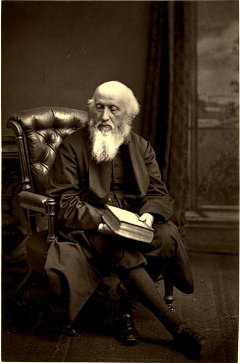
Lewis Carroll was a poor sleeper and did a lot of thinking in bed. The notes he made in the dark often turned out to be illegible the next day, but he didn’t want to go to the trouble of lighting a lamp in order to scribble a few lines.
So in 1891 he invented the nyctograph, a card containing a grid of cells that could guide his writing in the dark, using a peculiar alphabet he invented for the purpose:

“I tried rows of square holes,” he wrote, “each to hold one letter (quarter of an inch square I found a very convenient size), but the letters were still apt to be illegible. Then I said to myself, ‘Why not invent a square alphabet, using only dots at the corners, and lines along the sides?’ I soon found that, to make the writing easy to read, it was necessary to know where each square began. This I secured by the rule that every square-letter should contain a large black dot in the N.W. corner. … [I] succeeded in getting 23 of [the square letters] to have a distinct resemblance to the letters they were to represent.”
“All I have now to do, if I wake and think of something I wish to record, is to draw from under the pillow a small memorandum book containing my Nyctograph, write a few lines, or even a few pages, without even putting the hands outside the bed-clothes, replace the book, and go to sleep again. Think of the number of lonely hours a blind man often spends doing nothing, when he would gladly record his thoughts, and you will realise what a blessing you can confer on him by giving him a small ‘indelible’ memorandum-book, with a piece of paste-board containing rows of square holes, and teaching him the square-alphabet.”



